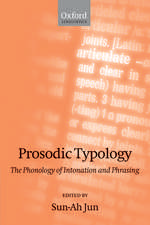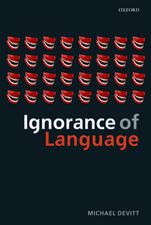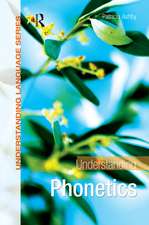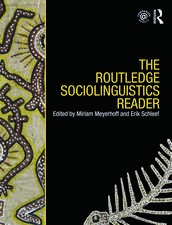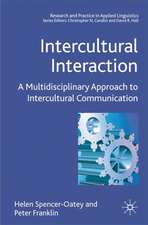Cultivating Cosmopolitanism for Intercultural Communication: Communicating as a Global Citizen: Routledge Studies in Rhetoric and Communication
Autor Miriam Sobre-Denton, Nilanjana Bardhanen Limba Engleză Paperback – 21 mai 2015
| Toate formatele și edițiile | Preț | Express |
|---|---|---|
| Paperback (1) | 363.00 lei 6-8 săpt. | |
| Taylor & Francis – 21 mai 2015 | 363.00 lei 6-8 săpt. | |
| Hardback (1) | 1058.10 lei 6-8 săpt. | |
| Taylor & Francis – 7 mai 2013 | 1058.10 lei 6-8 săpt. |
Din seria Routledge Studies in Rhetoric and Communication
-
 Preț: 386.43 lei
Preț: 386.43 lei -
 Preț: 362.49 lei
Preț: 362.49 lei - 18%
 Preț: 1001.07 lei
Preț: 1001.07 lei -
 Preț: 462.63 lei
Preț: 462.63 lei - 12%
 Preț: 312.43 lei
Preț: 312.43 lei -
 Preț: 389.38 lei
Preț: 389.38 lei -
 Preț: 309.69 lei
Preț: 309.69 lei - 20%
 Preț: 373.53 lei
Preț: 373.53 lei -
 Preț: 465.49 lei
Preț: 465.49 lei - 18%
 Preț: 997.90 lei
Preț: 997.90 lei -
 Preț: 388.16 lei
Preț: 388.16 lei - 18%
 Preț: 1218.12 lei
Preț: 1218.12 lei - 18%
 Preț: 1060.87 lei
Preț: 1060.87 lei - 18%
 Preț: 1106.02 lei
Preț: 1106.02 lei - 18%
 Preț: 1113.45 lei
Preț: 1113.45 lei -
 Preț: 317.48 lei
Preț: 317.48 lei -
 Preț: 436.14 lei
Preț: 436.14 lei - 18%
 Preț: 1004.20 lei
Preț: 1004.20 lei -
 Preț: 411.42 lei
Preț: 411.42 lei -
 Preț: 449.41 lei
Preț: 449.41 lei - 18%
 Preț: 1116.38 lei
Preț: 1116.38 lei - 15%
 Preț: 421.44 lei
Preț: 421.44 lei - 18%
 Preț: 1163.66 lei
Preț: 1163.66 lei - 18%
 Preț: 1166.68 lei
Preț: 1166.68 lei - 18%
 Preț: 1059.14 lei
Preț: 1059.14 lei - 26%
 Preț: 875.55 lei
Preț: 875.55 lei - 34%
 Preț: 184.00 lei
Preț: 184.00 lei - 18%
 Preț: 1109.99 lei
Preț: 1109.99 lei - 18%
 Preț: 1053.16 lei
Preț: 1053.16 lei - 18%
 Preț: 1057.05 lei
Preț: 1057.05 lei - 18%
 Preț: 1330.34 lei
Preț: 1330.34 lei - 30%
 Preț: 849.29 lei
Preț: 849.29 lei -
 Preț: 462.63 lei
Preț: 462.63 lei - 18%
 Preț: 1218.08 lei
Preț: 1218.08 lei - 18%
 Preț: 1056.71 lei
Preț: 1056.71 lei - 18%
 Preț: 1056.35 lei
Preț: 1056.35 lei
Preț: 363.00 lei
Nou
Puncte Express: 545
Preț estimativ în valută:
69.46€ • 74.28$ • 57.91£
69.46€ • 74.28$ • 57.91£
Carte tipărită la comandă
Livrare economică 17 aprilie-01 mai
Preluare comenzi: 021 569.72.76
Specificații
ISBN-13: 9781138885561
ISBN-10: 1138885568
Pagini: 198
Dimensiuni: 152 x 229 x 15 mm
Greutate: 0.29 kg
Ediția:1
Editura: Taylor & Francis
Colecția Routledge
Seria Routledge Studies in Rhetoric and Communication
Locul publicării:Oxford, United Kingdom
ISBN-10: 1138885568
Pagini: 198
Dimensiuni: 152 x 229 x 15 mm
Greutate: 0.29 kg
Ediția:1
Editura: Taylor & Francis
Colecția Routledge
Seria Routledge Studies in Rhetoric and Communication
Locul publicării:Oxford, United Kingdom
Public țintă
Postgraduate and UndergraduateCuprins
Foreword Introduction 1. Tracing Cosmopolitanism and its Value for Intercultural Communication 2. Differentiating Cosmopolitanism from Similar Intercultural Communication Theories/Concepts/Models 3. Identity, Hybridity and Critical Self Transformation: Toward a Model of Cosmopolitan Personhood 4. The Role of the Imagination and Kindness to Strangers: Cosmopolitan Personhood 5. Operationalizing Cosmopolitanism for Intercultural Communication 6. Questions of MethodologyChapter 7. Case Studies of Cosmopolitanism in Intercultural Communication Practice 8. Issues in Cosmopolitan Pedagogy for Intercultural Communication Conclusion
Recenzii
Winner of the National Communication Association's International and Intercultural Communication Division's 2014 Outstanding Authored Book of the Year award.
Descriere
This book engages the notion of cosmopolitanism as it applies to intercultural communication, which itself is undergoing a turn in its focus from post-positivistic research towards critical/interpretive and postcolonial perspectives, particularly as globalization informs more of the current and future research in the area. It emphasizes the postcolonial perspective in order to raise critical consciousness about the complexities of intercultural communication in a globalizing world, situating cosmopolitanism -- the notion of global citizenship -- as a multipurpose lens for research. Cosmopolitanism as a theoretical repertoire provides nuanced descriptions of what it means to be and communicate as a global citizen, how to study interconnectedness within and across cultures, and how to embrace differences without glossing over them. Moving intercultural communication studies towards the global in complex and nuanced ways, this book highlights crucial links between globalization, transnationalism, postcolonialism, cosmopolitanism, and intercultural communication, and helps in the creation of classroom spaces devoted to exploring these links. It engages the links between theory and praxis in order to move towards intercultural communication pedagogy and research that simultaneously celebrates and interrogates issues of cultural difference with the aim of creating continuity rather than chasms. In sum, this book orients intercultural communication scholarship firmly towards the critical and postcolonial, while still allowing the incorporation of traditional intercultural communication concepts, thereby preparing students, scholars, educators and interculturalists to communicate ethically in a world that is simultaneously global and local.



